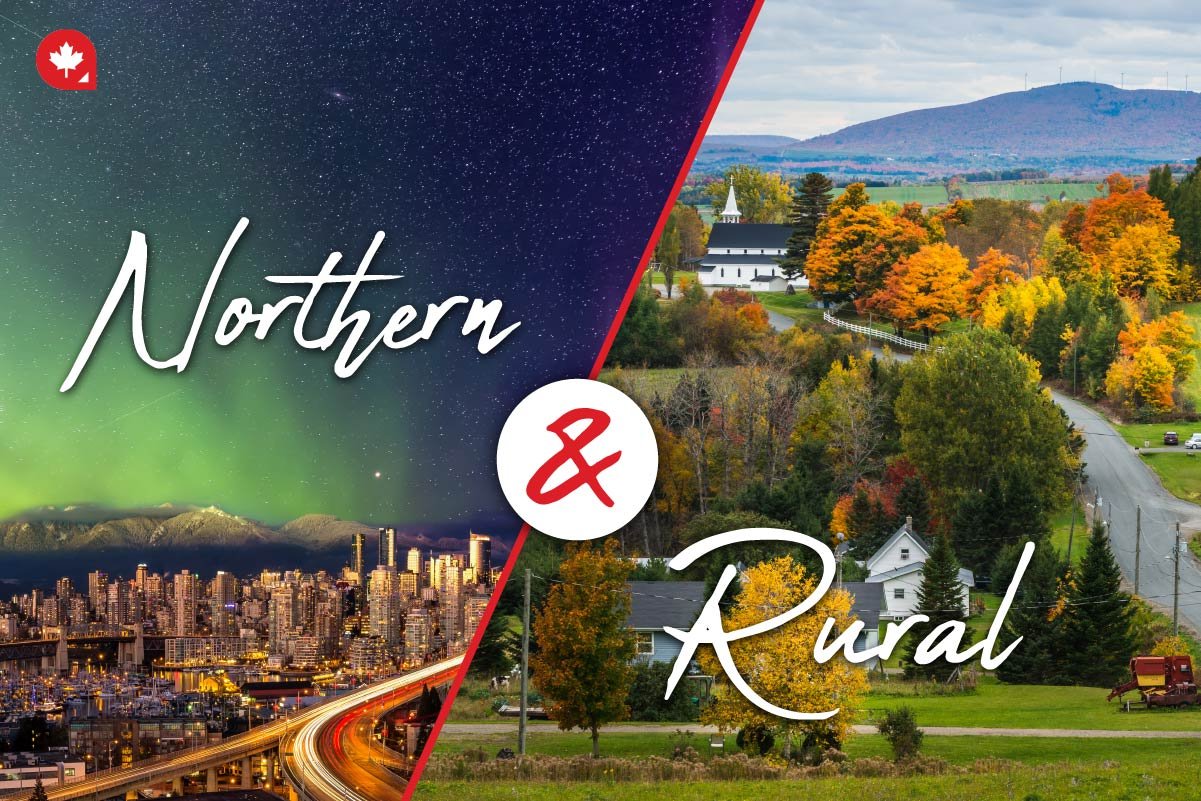Dreaming of a career change amidst breathtaking landscapes and close-knit communities? Rural and Northern Canada offer a unique work environment with exciting opportunities across various industries.
We look at the top in-demand jobs in these regions, from healthcare professionals to park rangers and engineers. So whether you're a skilled worker seeking a fresh start or a recent graduate eyeing an adventure, you may find that your dream job awaits in Canada's stunning wilderness.
Learn more about life in urban vs rural Canada.
History of Cultural and Demographic Landscape of Rural and Northern Canada

Rural and northern Canada's history is a story of evolving cultures and demographics. Indigenous communities thrived across this vast landscape for thousands of years, developing rich and diverse traditions. The arrival of Europeans brought a new chapter, starting with a limited presence focused on exploration and trade. The colonial era then ushered in a period of resource extraction and trade that would significantly impact both Indigenous and European populations in rural and northern Canada.
Indigenous Communities
Before the arrival of European settlers, rural and northern Canada was predominantly inhabited by Indigenous peoples who had developed rich and diverse cultures over thousands of years. These communities were spread across the region, each with its unique traditions, languages, and social structures
Initial European Settlement
Initial European settlement in rural and northern Canada was minimal before the major waves of immigration. The region was sparsely populated, with only a few scattered European outposts and trading posts. The arrival of Europeans, primarily explorers and fur traders, had a limited impact on the overall demographic composition of the area.
The Colonial Era
During the colonial era, the presence of Europeans in rural and northern Canada was mainly focused on trade and resource extraction rather than permanent settlement. The interactions between Europeans and Indigenous peoples were often centered around the fur trade and other economic activities, leading to cultural exchanges and sometimes conflicts.
Working in Rural and Northern Canada

If you're up to tackling a new frontier in Canada, you'll find that the vast landscapes of rural and Northern Canada offer a unique lifestyle and a thriving job market. As a skilled worker looking for a change of pace and exciting opportunities, this region might be the perfect fit. Here's a closer look at the top job sectors and the advantages of working in these areas.
Top Sectors in Rural and Northern Canada
Several key industries drive the economy in rural and Northern Canada, providing a diverse range of job opportunities. Here are some of the frontrunners.
| Sector | Description |
|---|---|
| Healthcare | With growing populations and a sometimes remote environment, healthcare professionals are in high demand. Nurses, medical technicians, and specialists are just a few examples. |
| Natural Resources | Canada's rich natural resources like minerals, timber, and oil and gas strongly demand skilled workers. Geologists, engineers, and heavy equipment operators are crucial players in these sectors. |
| Agriculture and Farming | Rural Canada is the heart of the country's agricultural industry. Farmers, ranchers, and agricultural technicians are essential for maintaining a strong food supply chain. |
| Tourism and Hospitality | The breathtaking scenery and abundant outdoor activities attract tourists year-round. Hotels, lodges, and adventure outfitters rely on skilled staff like park rangers, chefs, and tour guides. |
Top In-demand Jobs in Rural and Northern Canada
Considering a career change amidst breathtaking landscapes and close-knit communities? Look no further than rural and Northern Canada. These regions offer a unique work environment with exciting opportunities across various industries. While the pace of life might be slower, the demand for skilled workers is high. Below are some of the most in-demand jobs in these regions, with National Occupational Classification (NOC) Codes and a Talent.com estimate of salaries for each profession.
| Occupation | NOC Code | Average Annual Salary in CAD |
|---|---|---|
| Registered Nurse | NOC 31301 | 73,185 |
| Physician | NOC 31102 | 249,998 |
| Heavy Equipment Operator | NOC 73400 | 58,500 |
| General Farm Worker | NOC 85100 | 31,135 |
| Agricultural Technician | NOC 22110 | 61,138 |
| Teacher | NOC 41220 | 48,750 |
| Park Ranger | NOC 22113 | 54,319 |
| Cook | NOC 63200 | 31,200 |
| Chef | NOC 62200 | 41,378 |
| Tour Guide | NOC 64320 | 37,050 |
| Mechanical Engineer | NOC 21301 | 120,368 |
Benefits of Working in Rural or Northern Canada
Beyond the stunning landscapes and close-knit communities, rural and Northern Canada offer a compelling proposition for your career. Here's why working in these regions can be a strategic and rewarding move.
Faster Track to Leadership
Imagine a work environment where your skills and experience are highly valued. Due to a lower pool of qualified candidates, rural and Northern employers often need more staffing. This translates to greater opportunities for career advancement. You might find yourself taking on leadership roles sooner and having a more significant impact on your organization.
Competitive Salaries and Signing Bonuses
To attract and retain skilled workers, employers in these regions are often willing to offer competitive salaries and attractive signing bonuses. This can significantly boost your earning potential compared to similar positions in larger cities.
Government Support for Newcomers
The Canadian government recognizes the importance of attracting skilled workers to rural and Northern areas. Several support programs exist to help newcomers integrate into these communities. These programs might offer assistance with finding housing, employment search support, and language training.
Visit the provincial government websites for information about settlement services. Many rural and Northern communities also have designated welcome centers that can provide information on local settlement services and programs.
Living the Rural Canadian Dream
If you're craving a life less ordinary, Rural and Northern Canada offer a unique opportunity to trade the hustle and bustle of city life for a slower pace and a deep connection with nature. Imagine waking up to crisp morning air and stepping outside your door to a backdrop of majestic mountains or glistening lakes. Here, communities are close-knit, neighbors becoming friends, and a strong sense of belonging permeates the atmosphere.
Embrace the Outdoors
Step outside, and your playground expands. Hiking, fishing, camping, and canoeing become weekend staples. Winter transforms the landscape into a wonderland for snowshoeing, skiing, and ice fishing. Outdoor enthusiasts will find endless opportunities to explore the breathtaking natural beauty that surrounds them.
Finding Your Peace
Life moves at a gentler pace in rural and Northern Canada. There's less traffic congestion, a quieter environment, and more time to connect with yourself and your loved ones. Whether it's curling up with a good book by the fireplace or stargazing on a clear night, a sense of tranquility awaits.
Facing the Realities
It's important to acknowledge that rural and Northern Canadian living comes with challenges. Here are just some of them:
- Remoteness is a factor, with distances between towns sometimes significant
- Access to certain amenities, like specialty stores or a wider variety of restaurants, might be limited
- Winters can be harsh, with long stretches of cold temperatures and snowfall.
However, for those seeking a simpler, more nature-focused life, these challenges are often outweighed by the unique rewards of living in such a stunning and welcoming environment.
Immigrate to Canada, Settle in Rural or Northern Canada

Canada, with its vast landscapes and welcoming communities, offers a unique opportunity for skilled immigrants seeking a fresh start away from the bustling city. Ready to immigrate to Canada and live and work in Rural or Northern Canada? Then, let's explore Canadian immigration pathways ideal for anyone seeking a fulfilling career and a slower pace of life surrounded by stunning natural beauty.
The Rural and Northern Immigration Pilot (RNIP)
The RNIP program streamlines the immigration process for skilled workers who have secured job offers in designated communities within rural and Northern Canada. These communities are actively seeking to attract new residents and address labor shortages.
The RNIP offers faster processing times than other immigration programs, making it an attractive option for those eager to begin their Canadian adventure.
Provincial Nominee Programs (PNPs)
Most Canadian provinces and territories offer Provincial Nominee Programs (PNPs) with specific streams focused on attracting skilled workers to rural and Northern areas. These provincial Canadian immigration programs often have their own eligibility requirements and selection processes tailored to the specific needs of each province.
By researching PNPs alongside the RNIP, you can increase your chances of finding an immigration pathway that aligns with your skills and desired location. Learn more about Canada's PNP.
Here are some examples of PNPs with streams focused on rural and Northern Canada:
- Alberta Advantage Immigration Program (AAIP)
- Manitoba Provincial Nominee Program (MPNP)
- Saskatchewan Immigrant Nominee Program (SINP)
- Ontario Immigrant Nominee Program (OINP)
FAQs
Will the RNIP Remain a Pilot Program?
The Honorable Marc Miller, Minister of Immigration, Refugees, and Citizenship, announced on March 6, 2024, that the IRCC will establish a permanent rural immigration program.
Do I Need a Job to Apply to the RNIP?
Yes. To apply for the RNIP, you'll need a full-time, permanent job offer from an employer in your chosen community. To be considered valid, the job must be full-time and non-seasonal.




